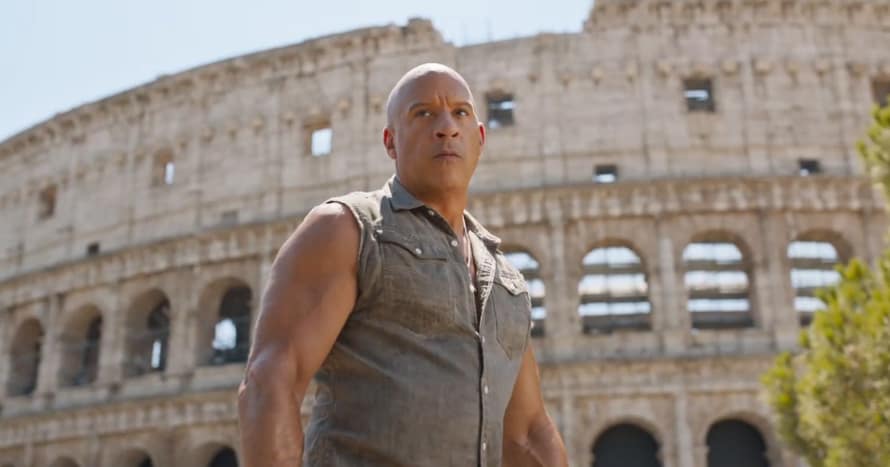By Lynn Venhaus
The turbo-charged “Fast X,” aka “Fast Ten,” the latest entry of the 22-year-old “Fast and Furious” saga, continues to defy logic and physics in a dizzying grandiose globe-trotting revenge tale.
A gimmicky gearhead grind, no. 10 features a sprawling star-studded cast racing from one continent to the next between massive explosions, shoot-outs, fisticuffs, and an enormous cavalcade of car crashes all staged to show off high-tech weaponry, fast-paced fight choreography and sensational stunts.
As usual, the muscular hero Dom Toretto has a price to pay for antagonizing his foes, but his list of friends and enemies certainly has grown over the years. We pick up with doting dad Dom teaching his 8-year-old son Brian (Leo Abelo Perry) his own set of rules on the road while his wife Lettie (Michelle Rodriguez) is helping Grandma (Rita Moreno) cook the family dinner, a time-honored ritual.
The gang’s all there – the bickering yet bonded core group of Dom’s team: Roman Pearce (Tyrese Gibson), mechanic Tej Parker (Chris “Ludacris” Bridges), hacker Ramsey (Nathalie Emmanuel), and Han Lue (Sung Kang).
In recent films, their certain set of skills have been in demand by an international government operation called “The Agency.” But even those seemingly fortresses of good can be infiltrated by evildoers, especially this chapter’s megalomaniac villain Dante (Jason Momoa).
He’s the vengeful son of drug kingpin Hernan Reyes, who was killed in “Fast Five,” and now comes calling with heavy artillery, having spent the last 12 years planning his retaliation.

The hulking beefcake Momoa, best known as the DC superhero Aquaman, has a blast going over-the-top as a flamboyant, preening sociopath seeking vengeance. Part Cesar Romero’s Joker, part Jim Carrey’s Riddler, and all peacock-strutting and rooster-crowing swagger, Momoa ups the ante as a sadistic dominating presence. (His character is hastily explained as being institutionalized.)
Dom’s sister Mia (Jordana Brewster), widow of Brian O’Conner (Paul Walker, who died in 2013, and was in five of the films), and brother Jakob (John Cena) also figure into the plot threads. And a noteworthy sentimental touch: Paul’s daughter Meadow Walker has a cameo as a flight attendant helping Jakob.
Oscar winners Charlize Theron, as cyberterrorist Cipher, Helen Mirren as Shaw’s (Jason Statham) mom, and Brie Larson as Tess, daughter of Mr. Nobody (Kurt Russell), make brief appearances, and Moreno has one scene.
But even the big-name cast – peppered with stunning cameos (must-see end credits) that the internet has already spoiled – is overshadowed by the mind-numbing number of pileups, combustible engines, bomb detonations, and burning rubber that result in a reckless high body count and ridiculous disregard for the laws of gravity.
That’s not a surprise – it’s always expected in these big, bold and bravura blockbusters. Yet, for those who have been paying attention throughout the soap opera-on-wheels thrill ride sequels, some previous villains are now allies (well, maybe frenemies in a couple cases) and it will be established that former friends betray the good guys. That can get rather head-scratching – but really, thinking is not a requirement here.
Nevertheless, the one constant is that the theme of family remains central to the core. It’s just that the death-defying action becomes a distraction as escaping without harm gets increasingly preposterous.
When this popular franchise began, the personalities carried the minimal plot and maximum action adventures through, but as the scope became bigger, the plots became more convoluted.
I can’t imagine anyone who hasn’t seen the last four or five really knowing – or caring – what has happened and what is going on now, as they’ve swelled from streetfighters to save-the-world in land, sky, and sea scenarios.

Case in point: A submarine in the South Pole. Before you ponder this, keep in mind the latest cliffhanger ending is an intriguing tease for “Fast X Part 2,” now scheduled for 2025. Apparently, not the end of the road but “the last chapters” with another or two.
This latest excursion through Brazil, Rome, Portugal, London, Los Angeles, and Antarctica is ultimately fan service. Let’s face it – few view these for interesting intricate stories. Now going into their third decade, people want bullets to spray, cars to fly and more pedals to the metal than in the last chapter.
The stories are such a minimal template that I’ve accused them of being written by chimps, but now, after number 10, I’m convinced they are employing AI.
The latest screenwriters – veteran Justin Lin plus newbie Dan Mazeau — touch on previous scenarios for some sense of a plot thread, but it doesn’t make “Fast X” easy to follow. The characters are based on those created by Gary Scott Thompson in 2001’s “The Fast and the Furious.”
Lin, who directed the third through sixth movies (“The Fast and the Furious: Tokyo Drift” in 2006, “Fast and Furious” in 2009, “Fast Five” in 2011 and “Fast and Furious 6” in 2013, returned for the ninth (“F9, The Fast Saga” in 2021), but abandoned directing this movie, over ‘creative differences,’ and Louis Leterrier, who made the first two “Transporter” movies, took over. Lin, however, stayed on as a producer and has a screenwriting credit.
The entire canon includes “2 Fast 2 Furious” in 2003, “Furious 7” in 2015, “The Fate of the Furious” in 2017, and then “Fast and Furious Presents Hobbs and Shaw” in 2019.
What happens next will determine the franchise’s grand finale. But harkening back to the early glory days would be a nice change of pace, for these increasingly ludicrous sequels have spun the original intentions out of control. After all, it’s supposed to be about family.

“Fast X” is a 2023 action thriller directed by Louis Leterrier and starring Vin Diesel, Michelle Rodriguez, Jason Momoa, Charlize Theron, Jason Statham, John Cena, Jordana Brewster, Brie Larson, Helen Mirren, Rita Moreno, Tyrese Gibson, Sung Kang, Nathalie Emmanuel, Ludacris, Scott Eastwood, Alan Ritchson. It is rated PG-13 for intense sequences of violence, action and language, and some suggestive material. and the run time is 2 hours, 21 minutes. It opened in theaters May 19. Lynn’s Grade: C-.

Lynn (Zipfel) Venhaus has had a continuous byline in St. Louis metro region publications since 1978. She writes features and news for Belleville News-Democrat and contributes to St. Louis magazine and other publications.
She is a Rotten Tomatoes-approved film critic, currently reviews films for Webster-Kirkwood Times and KTRS Radio, covers entertainment for PopLifeSTL.com and co-hosts podcast PopLifeSTL.com…Presents.
She is a member of Critics Choice Association, where she serves on the women’s and marketing committees; Alliance of Women Film Journalists; and on the board of the St. Louis Film Critics Association. She is a founding and board member of the St. Louis Theater Circle.
She is retired from teaching journalism/media as an adjunct college instructor.




